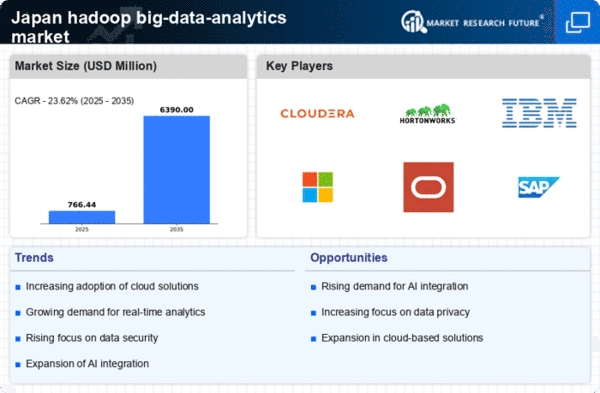Expansion of IoT Devices
The proliferation of Internet of Things (IoT) devices in Japan is significantly impacting the hadoop big-data-analytics market. As more devices become interconnected, the volume of data generated is increasing exponentially. This influx of data necessitates robust analytics solutions capable of processing and analyzing large data sets efficiently. It is estimated that by 2026, the number of IoT devices in Japan will exceed 1 billion, creating a substantial demand for hadoop-based analytics tools. Organizations are leveraging these tools to extract actionable insights from IoT data, thereby enhancing operational efficiency and customer engagement. The integration of hadoop with IoT analytics is expected to be a key driver for growth in the hadoop big-data-analytics market.
Increasing Demand for Real-Time Analytics
The hadoop big-data-analytics market in Japan is experiencing a surge in demand for real-time analytics solutions. Organizations are increasingly recognizing the value of timely insights derived from vast data sets. This trend is driven by the need for businesses to make informed decisions quickly, particularly in sectors such as finance and retail. According to recent data, the market for real-time analytics is projected to grow at a CAGR of approximately 25% over the next five years. Companies are investing in hadoop-based solutions to harness the power of real-time data processing, enabling them to respond to market changes and customer needs more effectively. This shift towards real-time analytics is likely to enhance operational efficiency and drive competitive advantage in the hadoop big-data-analytics market.
Rising Focus on Data-Driven Decision Making
In Japan, there is a growing emphasis on data-driven decision-making among businesses, which is propelling the hadoop big-data-analytics market. Companies are increasingly recognizing the importance of leveraging data to inform strategic choices and enhance operational performance. This trend is evident in various industries, including manufacturing and healthcare, where data analytics is being utilized to optimize processes and improve outcomes. Research indicates that organizations that adopt data-driven strategies are 5 times more likely to make faster decisions than their competitors. Consequently, the demand for hadoop-based analytics solutions is expected to increase as businesses seek to harness the power of data for competitive advantage.
Emergence of Advanced Data Security Solutions
As data breaches and cyber threats become more prevalent, the hadoop big-data-analytics market in Japan is witnessing a growing demand for advanced data security solutions. Organizations are increasingly prioritizing the protection of sensitive information, leading to investments in robust security measures integrated with analytics platforms. The market for data security solutions is projected to grow by 20% annually, reflecting the urgency for businesses to safeguard their data assets. Hadoop's capabilities in managing large volumes of data while ensuring security compliance are becoming essential for organizations. This focus on data security is likely to drive the adoption of hadoop big-data-analytics solutions, as companies seek to mitigate risks associated with data vulnerabilities.
Government Initiatives for Digital Transformation
The Japanese government is actively promoting digital transformation across various sectors, which is fostering growth in the hadoop big-data-analytics market. Initiatives aimed at enhancing data utilization and promoting smart city projects are encouraging organizations to adopt advanced analytics solutions. The government's investment in technology infrastructure is expected to reach ¥1 trillion by 2027, facilitating the adoption of hadoop-based analytics tools. This support is likely to drive innovation and improve data-driven decision-making processes within public and private sectors. As organizations align with government objectives, the demand for hadoop big-data-analytics solutions is anticipated to rise, contributing to the overall market expansion.

















